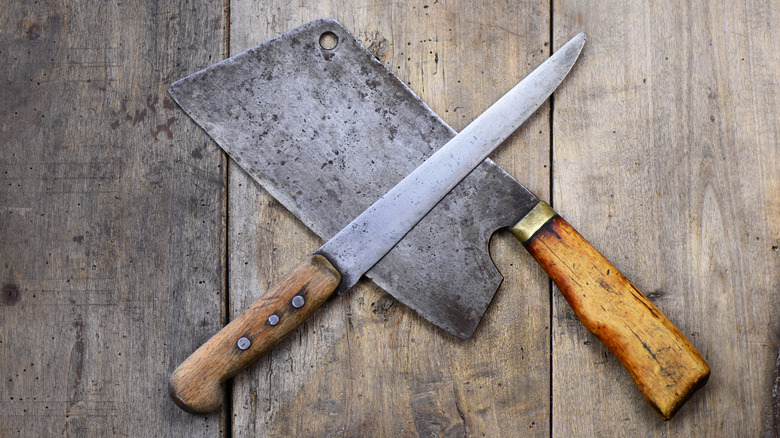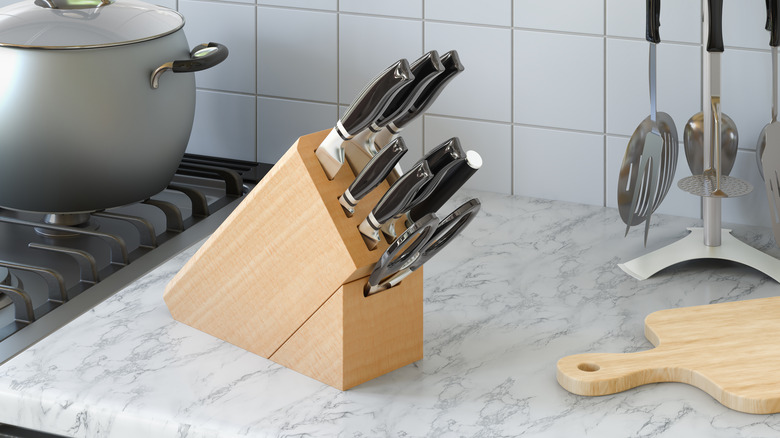Easily Remove Rust From Your Kitchen Knives With An Unexpected Pantry Staple
Maintaining a busy home can be a part-time job, and it often feels like there is a never-ending to-do list of chores. Checking for rust on your kitchen utensils probably isn't near the top of your daily priorities, but it is an integral part of sustaining a healthy and hygienic kitchen. Rust can develop on kitchen knives primarily from the presence of moisture and oxygen. Most kitchen knives are made of steel, which contains iron. When exposed to moisture, such as when left damp after use, the iron in the steel reacts with oxygen from the air to form iron oxide, commonly known as rust. This process is accelerated in environments with high humidity levels. Fortunately, rust can easily be removed from your kitchen knives with the help of a potato.
Yes, you read that correctly. Using a potato to remove rust from kitchen knives is a simple yet effective technique due to the potato's oxalic acid content. Oxalic acid is a naturally occurring compound in many vegetables, including potatoes. When a potato is sliced and rubbed onto the rusty areas of a knife blade, the oxalic acid reacts with the iron oxide, effectively breaking it down and loosening its grip on the metal surface. This reaction results in the formation of a compound that can be easily wiped away, leaving your knife cleaner and free from rust. So grab a spud to get started!
How to remove rust using a potato
Removing rust from kitchen knives with a potato is about as simple as it sounds. The first step is thoroughly washing and drying the knife to remove any surface dirt or debris. This initial cleaning ensures that the rust removal process can focus solely on the rusty areas of the blade without interference. Next, cut the potato in half to expose the flesh. If needed, you can slice a small piece off the rounded side of the potato to create a flat surface for easier handling.
Next, firmly grasp the knife handle and apply moderate pressure as you rub the cut side of the potato against the rusty areas of the blade. Work the potato back and forth across the rusted spots. The oxalic acid present in the potato will react with the rust, effectively loosening its grip on the metal surface. Continue rubbing the potato against the knife blade until you observe the rust beginning to lift off. Depending on the severity of the rust, this process may take several minutes. Sprinkling salt on the potato or leaving the knife to sit for up to 30 minutes after rubbing it may also help.
After removing the rust, rinse the knife to get rid of any remaining potato residue and rust particles. Then, dry the knife thoroughly with a clean cloth or paper towel to prevent moisture from promoting future rust formation. Finally, store the knife in a dry location or use a knife block or magnetic strip to keep it safely tucked away and readily accessible for future use.
Care tips to prevent rusty knives
It's essential to provide proper care and maintenance for your kitchen knives to prolong their lifespan and prevent rust development. One important tip is to always hand wash knives immediately after use with mild dish soap and warm water. Avoid placing knives in the dishwasher, as the harsh detergent and high heat can damage the blade's edge and promote rust formation. After washing, thoroughly dry the knives with a clean towel to remove any lingering moisture, which can contribute to rust over time.
Additionally, it's vital to properly store knives to prevent moisture and humidity exposure. Consider investing in a knife block, magnetic strip, or knife sheath to keep blades safely stored and protected from environmental factors. Avoid storing knives in a drawer where they can come into contact with other utensils and potentially become damaged or cause accidents. Regular honing is another crucial aspect of knife care. Use a honing steel or sharpening rod to realign the blade's edge and keep it sharp between sharpening sessions. Honing should be done before or after each use to maintain optimal cutting performance and prevent dullness, which can lead to increased pressure on the blade and potential rusting.
Finally, consider investing in high-quality knives made of stainless steel or other rust-resistant materials. No knife is entirely immune to rust. However, choosing knives with proper construction and materials can significantly reduce the risk of rust development and ensure long-term durability and performance in your kitchen.

